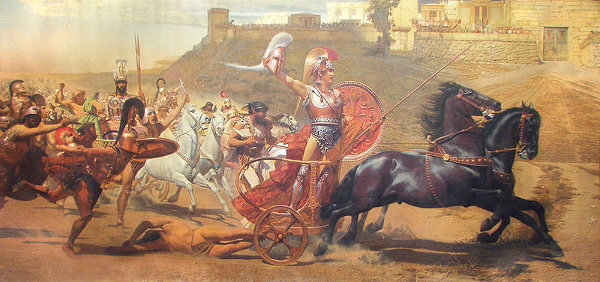
“‘There really are fictional heroes’ sounds true, but ‘Fictional heroes really exist’ sounds false.”
— James Cargile, Paradoxes, 1979

“‘There really are fictional heroes’ sounds true, but ‘Fictional heroes really exist’ sounds false.”
— James Cargile, Paradoxes, 1979
Cornelius Whur (1782–1853) had a gold heart and a tin ear. Moved by genuine feeling for the unfortunates around him, the Wesleyan minister produced some of the most lamentably funny poems of the 19th century:
Alas! Alas! the father said,
O what a dispensation!
How can we be by mercy led,
In such a situation?
Be not surprised at my alarms,
The dearest boy is without arms!
I have no hope, no confidence,
The scene around is dreary;
How can I meet such vast expense?
I am by trying weary.
You must, my dearest, plainly see
This armless boy will ruin me.
Whur’s other efforts include “The Diseased Legs” and “The Cheerful Invalid.” He has no monument.
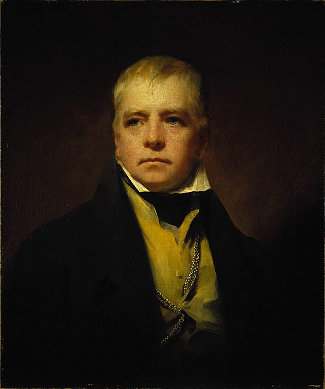
[Walter Scott] was scrupulously careful … to answer all letters addressed to him. In those days of high postage this was a tax not only on his time and his temper, but on his purse as well. He spent as much as one hundred and fifty pounds a year in postage. Once a mighty package came from the United States. Five pounds were due on it. When opened it was found to contain a manuscript called ‘The Cherokee Lovers,’ a drama written by a New York lady, who begged Scott to read and correct it, write a prologue and an epilogue, and secure a manager and a publisher. A fortnight later another package of similar size, charged with a similar postage, was placed in Scott’s hands. When opened, out popped another copy of ‘The Cherokee Lovers,’ with a note from the authoress explaining that, as the mails were uncertain, she had deemed it prudent to forward a duplicate.
— William Shepard Walsh, Handy-Book of Literary Curiosities, 1892
Any group of six people must contain at least three mutual friends or three mutual strangers.
Represent the people with dots, and connect friends with blue lines and strangers with red. Will the completed diagram always contain a red or a blue triangle?
Because A has five relationships and we’re using two colors, at least three of A’s connections must be of the same color. Say they’re friends:

Already we’re perilously close to completing a triangle. We can avoid doing so only if B, C, and D are mutual strangers — in which case they themselves complete a triangle:

We can reverse the colors if B, C, and D are strangers to A, but then we’ll get the complementary result. The completed diagram must always contain at least one red or blue triangle.
I think this problem appeared originally in the William Lowell Putnam mathematics competition of 1953. Six is the smallest number that requires this result — a group of five people would form a pentagon in which the perimeter might be of one color and the internal connections of another.
(Update: In fact the more general version of this idea was adduced in 1930 by Cambridge mathematician F.P. Ramsey. It is very interesting.) (Thanks, Alex.)
On Aug. 17, 1921, a bedraggled carrier pigeon landed at the feet of a policeman in Columbus Circle in New York. Tied to its leg was this message:
Notify Dan Singer, Belleclaire Hotel. I am lost in Hoodoo Mountains, Yellowstone Park. Send help, provisions and pack-horses. HELLER. 8-13-21.
At the Belleclaire Hotel police found insurance agent Daniel J. Singer, who identified Heller as naturalist and photographer Edmund H. Heller and recognized the bird as a veteran that had accompanied him on a trip to Africa with Theodore Roosevelt in 1909. Heller had kept it on the roof of the Belleclaire and taken it with him to Yellowstone recently to gather material for a lecture tour.
This was both dramatic and fishy. If the bird had left Wyoming on Aug. 13 then it had flown 1,900 miles in five days, an astonishing feat. Sure enough, when reporters contacted the superintendent of Yellowstone, he responded, “Edmund Heller is here. There is no foundation whatever for the report that he is or has been lost.”
Apparently someone had arranged the hoax in order to publicize Heller’s lectures, forging his signature on the note. The district attorney saw little humor in the stunt and began issuing subpoenas. The New York Times noted, “At the Belleclaire it was said that Singer was out of town, but had disclaimed responsibility and insisted that some person in the hotel perpetrated the hoax.”
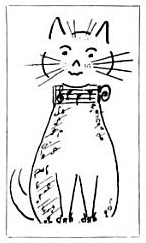
I send you a small sketch, ‘A Musical Cat.’ It will be perceived that each stroke is a sign used in music, and for the benefit of the uninitiated I give this explanation: Eyes, pauses; ears and nose, accents; whiskers, crescendos; mouth, mordente, outline of head, ties; collar, staff; bells, notes; body, two phrase lines; feet, two crescendos; toes, flats and sharps; tail, two ties.
— Mr. W. Gough, in Strand, October 1906
There was a young curate of Kew
Who kept a tom cat in a pew;
He taught it to speak
Alphabetical Greek
But it never got farther than μ.
— Anonymous
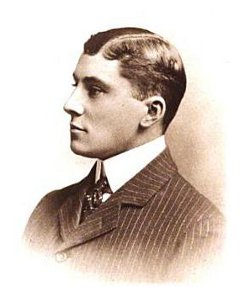
In 1898, 23-year-old Cambridge dropout Ewart Grogan found himself with a problem: He was in love with a rich girl, but her father forbade her to accept. So Grogan proposed to prove himself by making the first-ever transit of Africa from south to north.
He set out from Cape Town and spent two years struggling north through largely unexplored East Africa. Along the way he negotiated lions, cannibals, volcanoes, war, illness, exhaustion, and 400 miles of swamp, but in 1900 he wired Gertrude: “Have reached Cairo. My feelings just the same. Anxiously await your answer. Make it yes. Love, Ewart.” She wired back, “My feelings also unchanged. Am waiting for you. Gertrude.” They were married seven months after his return, and Grogan inscribed a copy of his bestselling account of the trip to his new father-in-law.
In 1932 Imperial Airways invited Grogan to repeat his trans-African journey, this time by air. What had taken two years now took eight days. “It seems beyond belief that a man could have that double experience in a lifetime,” he told the Daily Express. “It shows how fast the world is moving.”
sprezzatura
n. the art of making a difficult task appear effortless
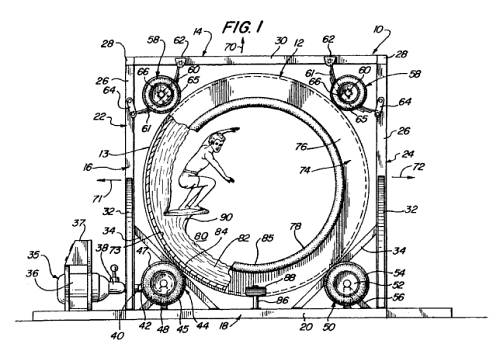
Rick Hilgert’s 1995 “wave generating apparatus” is essentially a giant horizontal centrifuge, a 25-foot tubular tank that’s spun until the water hugs the wall.
This creates “a continuous simulated ocean-type wave that will allow one to participate in body-surfing, boogie-boarding and/or surfboarding.”
What could go wrong?
The boy stood on the burning deck,
His fleece was white as snow,
He stuck a feather in his hat,
John Anderson, my Jo!
“Come back, come back,” he cried in grief,
“From India’s coral strands,
The frost is on the pumpkin, and
The village smithy stands.
Am I a soldier of the cross,
From many a boundless plain?
Should auld acquaintance be forgot
Where saints immortal reign?
Ye banks and braes o’ bonnie Doon,
Across the sands of Dee,
Can I forget that night in June?
My Country, ‘Tis of Thee.”
— Westminster Monthly, April 1910